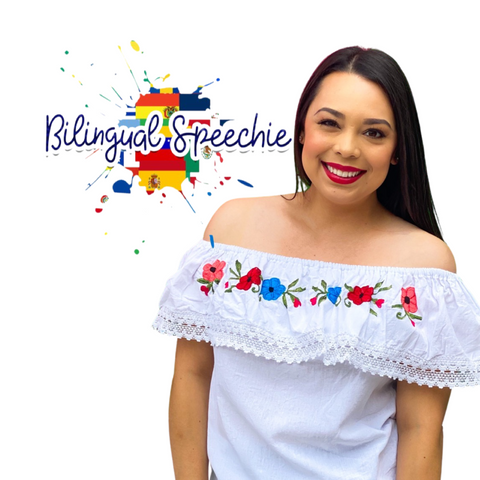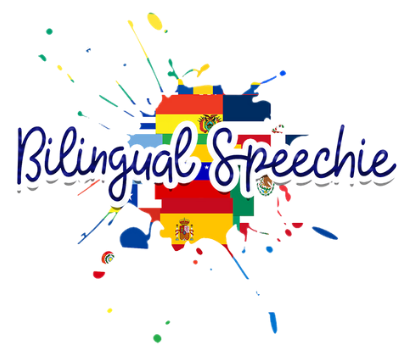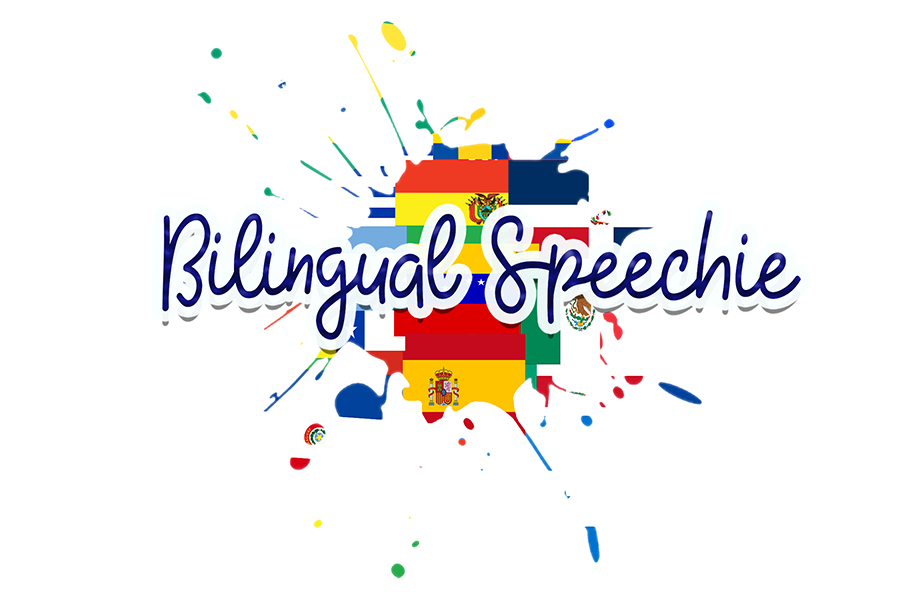by Liliana Diaz April 29, 2021 1 Comment
It is our responsibility as speech language pathologists to be able to effectively treat and work with people who have communication disorders regardless of the language they speak. There are several state and federal regulations that protect the rights of people who's native or first language is not English and it is our role as bilingual and/or monolingual speech language pathologists to be aware and understand the regulations in place as well as identify when an interpreter is needed and how to effectively assess and treat our clients with the use of an interpreter.
When I used to work in the early intervention setting, I worked with several families who's first language was not English. I was completely used to working with families who spoke Spanish as their first language, and as a bilingual (English/Spanish) speech language pathologist, I rarely needed to work with interpreters because I speak both English and Spanish fluently. However, I began to receive referrals to work with families who spoke Arabic. Finding a bilingual speech language pathologist in the area that I worked in who spoke Arabic was a challenge. Therefore, the only way to provide these families with speech services was to utilize a licensed interpreter during my sessions.
I learned several tips and other information as I began to work with an interpreter for the first time. For the very first time, I knew exactly how it felt like to be a monolingual SLP. I took this opportunity as a learning experience and reflect on how I can improve my family communication skills, cultural awareness and humility while working with these families. Continue reading to learn about some of the key points I took away while working with interpreters.
Choosing an Interpreter
Perhaps you own your own private practice and you will decide which contract company to hire. Or perhaps you work in a school district, and you cannot pick an interpreter because your school district selects the contract company to work with. Regardless of the situation you are in, you need to know what qualifications to look for in an interpreter. Also, keep in mind that the education and training requirements for interpreters may vary by state, however, the following qualifications should still remain the same.
Preparing Before the Session
When working with an interpreter, often I would arrange for a 15-30 minute discussion prior to the client's session in order to discuss the activities that were going to take place during the client's session. This allowed for the interpreter to review any specific terminology that might be needed for the session. It also allowed for my sessions to run smoothly because the interpreter knew exactly what the goal for the session was. Therefore, sessions did not need to be paused in order to answer any questions regarding clarity of the activity. In addition, we were able to review the family's expectations and cultural differences that would impact how I would interact with the family. For example, I learned that before entering the family's home, I had to take off my shoes and leave them in the hallway out of respect for the family's culture. Had I not known this, I could have possibly offended the family. Other tips I would suggest include:
Tips for During the Session
During my sessions, it was important that we discuss the SLP and interpreter roles with the family. We also discussed communication methods in case the family had any questions– it was important that the family knew that they can ask ME the questions instead of heavily relying on the interpreter only. One thing that I learned immediately was to address the family during interactions and not the interpreter. Often times, it was easy to fall into the trap of looking at the interpreter while discussing the client instead of looking at the family directly. Remember, the interpreter is YOUR voice and NOT your communication partner. Ensure that you direct all conversations with the family by making eye contact (as deemed culturally appropriate). Also be sure to:
Tips for After the Session
After each session, the interpreter and I would debrief for 15-30 minutes in order to make sure we both were on the same page in terms of the outcomes of the session. We also discussed any possible questions that the family had to ensure the questions were addressed properly. Lastly, we both would compare our observations of the session to ensure there was no miscommunication.
Hopefully these tips are useful in your practice. I highly recommend checking out ASHA's website for more detailed information about working with interpreters. You can learn more by clicking on this link "Collaborating with Interpreters, Transliterators, and Translators."
What other tips would you recommend to a SLP working with an interpreter? What has your experience been? I would love to know! Leave a comment down below!
October 09, 2022
Thank you for explaining how you should make sure to address the parent or family and not the interpreter during the session. My sister is going to be working with an interpreter for one of her clients. I’ll share this advice with her so she can make her clients feel more comfortable during the session. http://www.mayainterpreters.com
Comments will be approved before showing up.
by Liliana Diaz December 14, 2023
by Liliana Diaz July 23, 2023
Have a client on your caseload that is demonstrating difficulty producing the CH sound? Perhaps you're a parent whose child is in speech therapy working on the CH sound? The CH sound can be a tricky sound to teach because it's hard to visually see what's going on inside the mouth when saying the sound. But no worries, here are some tips to help achieve that tricky CH sound.
by Liliana Diaz February 13, 2023 1 Comment

Who are we?
Bilingual Speechie LLC. is a small business dedicated to providing inclusive and engaging speech therapy resources and activities for bilingual children, parents, SLPs and educators.
Bilingual Speechie LLC promotes bilingualism and multilingualism by dispelling common myths, providing education on bilingual language development, and promoting heritage language maintenance amongst bilingual families.
About the Owner:
Liliana Diaz-Vazquez is a certified licensed bilingual speech language pathologist (SLP), currently practicing in Chicago, Illinois. She obtained her bachelor’s degree in communication disorders (2012) and her master’s degree in speech language pathology at Saint Xavier University (2014). She is a certified member of the American Speech-Language and Hearing Association (ASHA) since 2014, a member of the Illinois Speech and Hearing Association (ISHA) since 2014 and maintains licensure in the state of Illinois.
Liliana is a first-generation Mexican-American Latina, a small business owner, a full-time school-based SLP, & a bilingual parent, who takes pride in her roots, culture, & heritage language. She loves being able to share her experience as a Latina SLP, and a bilingual mom, as well as her culture & heritage language with the educator, SLP, and parent community.
Liliana Diaz-Vazquez has extensive experience working with the bilingual English and Spanish speaking population & multilingual population. She specializes in augmentative/alternative communication (AAC), bilingual language development and language delays/disorders in bilingual/multilingual children. She has also worked in the early intervention setting for several years where she gained vast experience working with interpreters and bilingual/multilingual families.
Liliana began creating digital bilingual resources and activities in 2014 out of need while working full-time in the school setting as a SLP. Liliana worked with many Spanish-speaking families and quickly realized that there were limited Spanish and bilingual speech therapy resources available for her students and their families. In addition, Liliana quickly became aware that there was a need for education about bilingualism and typical bilingual language development as many of the families she worked with had encountered misinformation about bilingualism. Liliana began developing resources and eventually started Bilingual Speechie LLC with the mission to provide education to SLPs and families about bilingualism, as well as provide inclusive and diverse materials for speech therapy in order to help bilingual families and SLPs gain access to appropriate bilingual materials for children with communication disorders.
Today Liliana currently works full-time in the Chicago public school setting as a lead bilingual SLP where she consults and collaborates with SLPs daily to help them understand how to assess and provide culturally and linguistically appropriate services for bilingual and/or multilingual students. She also runs her small business, Bilingual Speechie LLC, and is on a mission to expand and grow her business so that all SLPs, educators, and families can have access to inclusive, diverse, and bilingual resources in a variety of languages for speech therapy.
Professional Development:
Liliana has vast experience as a speaker/presenter and has presented at several conferences over the years. You can view all previous conferences and topics that Liliana has presented on here. Liliana is available to present on topics such as best practices when working with multilingual populations, bilingual speech/language assessment and treatment, goal writing with multilingual populations and much more. If you are interested in booking Liliana for a conference or event please don't hesitate to send an email at lilianadiaz@bilingualspeechie.com
 English
en
English
en
 English
en
English
en


Liliana Diaz
Author